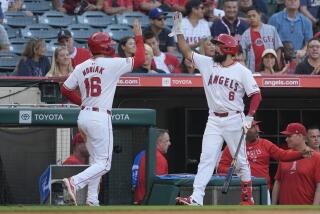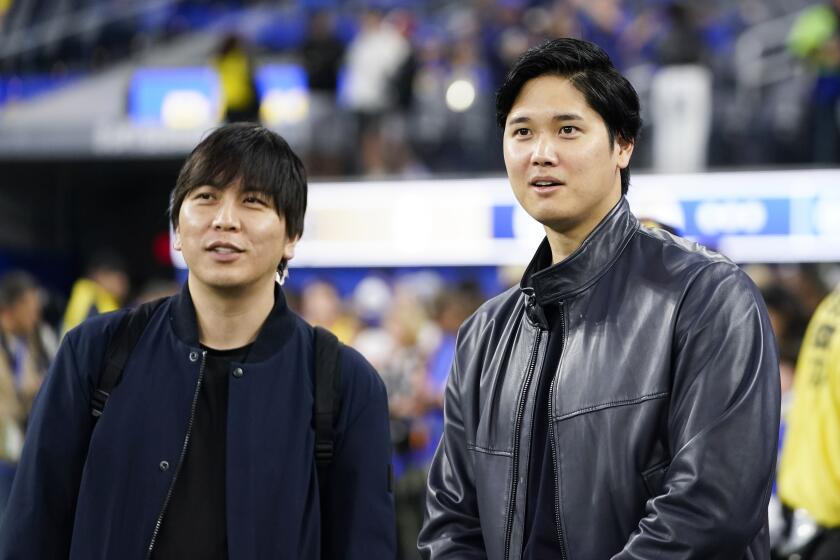TRADE BLOCK
The Toronto Blue Jays are willing to part with Roy Halladay.
The Angels don’t appear ready to sacrifice Erick Aybar.
How times and player fortunes have changed.
Sacrifice and Erick Aybar appeared together in a different context last October, when the shortstop’s botched suicide squeeze attempt in the playoffs encapsulated his standing as a player laden with unrefined potential.
Now look at him. Aybar is leading the major leagues with a .439 batting average in July and has helped the Angels go 14-3 since sluggers Torii Hunter and Vladimir Guerrero went on the disabled list.
The Angels’ appreciation of Aybar’s abilities runs so deep that he might be the player they were most reluctant to surrender in a proposed trade for Halladay, a Cy Young Award winner.
“What we see now is a player starting to come into his own who’s very, very talented,” Angels General Manager Tony Reagins said of Aybar, who is hitting a team-leading .318 with three homers and 38 runs batted in, putting him on pace to set career highs in all three categories.
The switch-hitter is second in batting average among American League shortstops behind the New York Yankees’ Derek Jeter, who is hitting .323. Aybar brings a career-high nine-game hitting streak into the opener of a three-game series against Minnesota tonight at the Metrodome.
Where does Aybar rank among the league’s shortstops?
“He’s got to be around the top because he does things that some shortstops can’t do,” Angels third baseman Chone Figgins said. “You have [Oakland’s] Orlando Cabrera, who catches every single ball, but then he doesn’t get to the same balls that Aybar does.”
But it might be Aybar’s ability to consistently make the routine play that has signaled his arrival among the game’s elite. That was something he occasionally struggled with during his first three years in the majors because of lapses in concentration.
“He’s making those plays now,” Reagins said. “When a ground ball is hit in the six hole, it’s going to be caught. I think that’s the difference.”
Only 25, Aybar has evolved from a fleet-footed, free-swinging player to one whose improved plate discipline makes him a viable option to hit almost anywhere in the lineup, though he has mostly batted in the No. 9 spot this season.
His speed and career-best .357 on-base percentage make him an attractive leadoff choice and yet his .325 batting average with runners in scoring position could tempt Manager Mike Scioscia to put him near the heart of the order.
“With experience . . . he’ll be a candidate to hit in front of the middle of your lineup whether it’s one, two or even three,” Scioscia said.
And it’s all about the experience for Aybar. Injuries limited him to 79 games in 2007 and 98 games last season, when he suffered a dislocated pinkie. Playing every day has allowed him to achieve a comfort level he had previously experienced only in the minor leagues and in winter ball, where he hit .355 last year in his native Dominican Republic.
“The Erick Aybar that people knew in winter ball, I feel more like that now because I’m able to relax and implement the things in my game that I’ve been looking forward to doing in the big leagues,” Aybar said through an interpreter. “When you play every day, you get into a rhythm. You get into a routine even with the at-bats.”
Hitting coach Mickey Hatcher credited Aybar’s increased patience -- he has already drawn a career-high 16 walks with two months left in the season -- in part to the influence of veterans such as Hunter, Figgins and Bobby Abreu.
“We preach the fact that you have to start a game out by trying to see every one of the pitches that a pitcher throws,” Hatcher said. “If you have no idea, you’re just always in guess mode.”
Aybar looked as if he knew exactly which pitches were coming last week during a doubleheader against Kansas City in which he was seven for nine with a three-run triple that helped secure the Angels’ first doubleheader sweep in nearly six years.
Although acknowledging that he is pleased with his progress, Aybar vows not to become complacent.
“This surge that I’m going through doesn’t mean it’s the end of it for me, working-wise,” Aybar said. “I don’t want people to feel like I’m done” improving.
Aybar said his pregame routine has pretty much remained constant since arriving in the big leagues, only now he has a better understanding of how to integrate workouts with early batting practice, soft toss and bunting drills.
Bunting is one of Aybar’s strengths, though it hardly looked that way last October at Fenway Park when he failed to connect on a Manny Delcarmen fastball in the ninth inning of Game 4 of the AL division series. Reggie Willits, who was charging home on the pitch, was tagged out in a rundown and Boston went on to finish off the Angels.
“We all make mistakes and I actually took the time to work on that, to work on bunting and getting on top of the ball,” said Aybar, who has a team-leading 12 bunt hits.
Given the same scenario, runner on third and one out late in a game with the score tied, there is probably no one the Angels would rather have at the plate than Aybar.
All of that is why his name keeps coming up in trade proposals.
And why the Angels are so unwilling to move him.
“It feels good when people ask for you because it means that you’re playing at a good level and helping your team win,” Aybar said.
“But I feel bad when I see that because to think about the possibility of getting traded -- I have so many friends here that it would be hard if it ever happened.”
--
--
BEGIN TEXT OF INFOBOX
Hot commodity
ERICK AYBAR’S STATISTICS
*--* Yr. G AVG. R RBI HR BB ’06 34 250 5 2 0 0 ’07 79 237 18 19 1 10 ’08 98 277 53 39 3 14 ’09 80 318 40 38 3 16 *--*
Source: mlb.com
More to Read
Go beyond the scoreboard
Get the latest on L.A.'s teams in the daily Sports Report newsletter.
You may occasionally receive promotional content from the Los Angeles Times.







